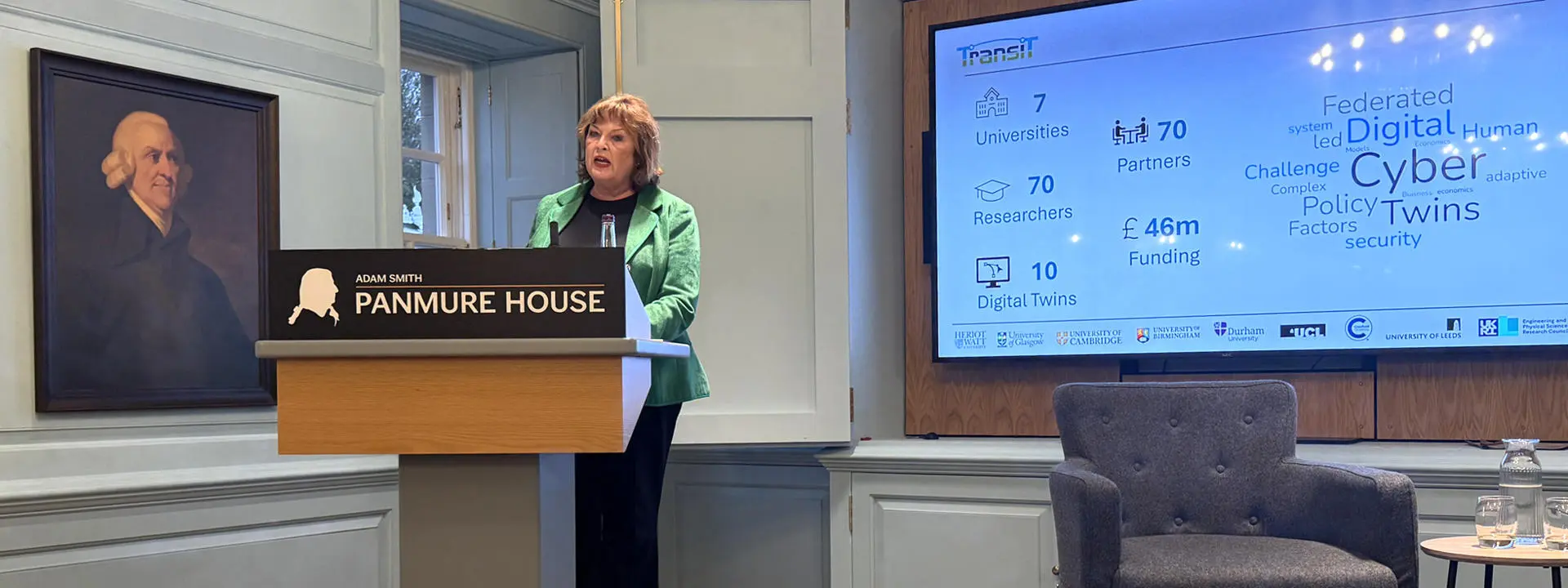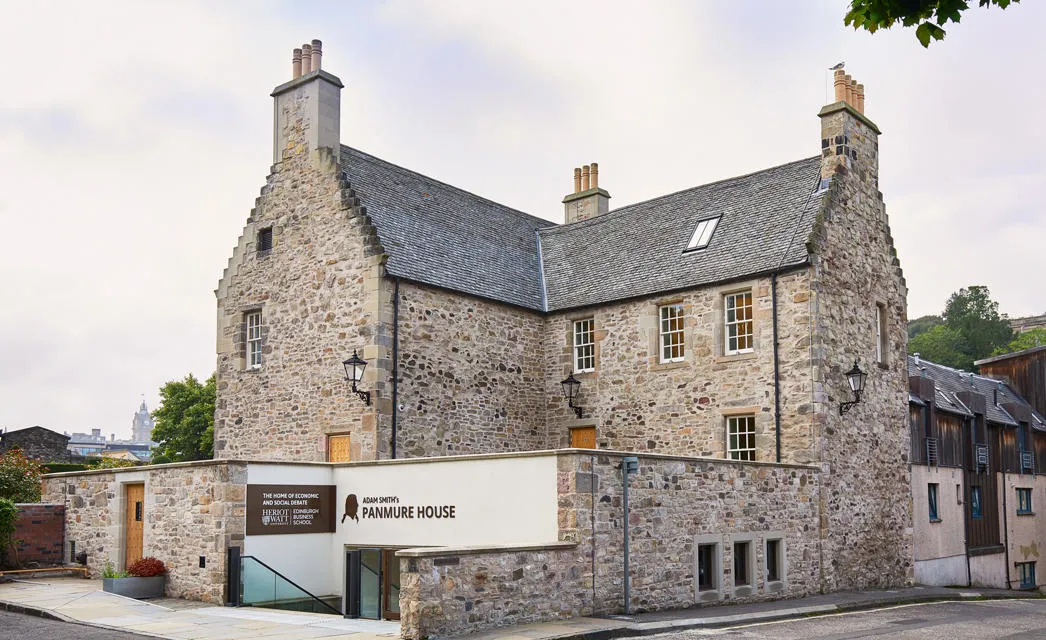Zero Emission Truck event welcomes Cabinet Secretary Fiona Hyslop MSP

Scotland’s Cabinet Secretary for Transport, Infrastructure and Connectivity, Fiona Hyslop MSP, visited Panmure House at Heriot-Watt University yesterday to address an industry event on decarbonising road freight in Scotland.
The event was hosted by the Zero Emission HGV team at Transport Scotland, Scotland’s national transport agency, in collaboration with the Centre for Sustainable Road Freight.
Around 30 industry representatives took part in the event, including trade associations, road haulage operators and electric fleet specialists who formed the Zero Emission Truck Taskforce. Also taking part were leaders from a group of eight consortia developing business cases for potential future battery electric heavy goods vehicle projects, through Transport Scotland’s HGV Consortium Builder scheme.
Scotland stands at the forefront of a profound transformation as our transport and energy sectors evolve to meet the changing demands of the 21st century.
The event highlighted impacts to date from the HGV Decarbonisation Pathway for Scotland, a plan published in March 2024 by the Zero Emission Truck Taskforce to help transition heavy goods vehicles (HGVs) to zero-emission technology.
Participants also heard about the next phase of groundbreaking research from the Centre for Sustainable Road Freight to identify where Scotland most urgently needs charging points for electric heavy goods vehicles.
This used real-world data from 80,000 truck journeys in Scotland, and has identified that at least 63 charging points are needed along major freight routes, including the A9, A90 and M74. Twenty six of these are already built or under development – meaning 37 additional sites are still needed.
Ms Hyslop said: “Scotland stands at the forefront of a profound transformation as our transport and energy sectors evolve to meet the changing demands of the 21st century. I see an opportunity and an imperative to electrify transport at pace in order to seize the benefits of this transition – for our hauliers, for our energy sector, for our financial sector and for our skills sector and of course, for the people of Scotland. More remains to be done to enable mass transition. We need more trucks on the road as soon as possible to build confidence in this new technology”

Professor Phil Greening, a logistics expert at Heriot-Watt University and Deputy Director of the Centre for Sustainable Road Freight, outlined three UK freight decarbonisation research projects, alongside the Centre’s work for Transport Scotland. These are TransiT, the UK’s largest research hub dedicated to rapidly decarbonising transport using digital twins; Project JOLT (Joint Operator Logistics Trial), a programme which is trialling electric heavy goods vehicles with logistics operators; and DARe (the National Hub for Decarbonised Adaptable and Resilient Transport Infrastructures), which is focused on helping the UK’s transport sector prepare and adapt to climate change.
He said: “It’s vital that our research is shaped by industry insights, including from logistics operators running trucks on Scotland’s roads every day.
“Freight really matters and as a country, we haven’t really recognised that for some time. Our research is about reducing uncertainty so that organisations can invest in zero emissions infrastructure.”
Organisations represented at the event included Logistics UK, the Scottish Wholesale Association, the Road Haulage Association, the Society of Motor Manufacturers and Traders, Russell Logistics, the Scotch Whisky Association and the National Energy System Operator (NESO), a new public body created by the UK government to manage Britain's energy system.
Other organisations represented at the event included Aegis, Fleete Group, VEV Services, Voltempo Group, Neot Capital, Zenobē Energy and Scottish Futures Trust.

Sukky Choongh, Environmental Policy Manager at the Society of Motor Manufacturers and Traders, said: “It’s important to have policy certainty and to have a clear direction and support for hauliers to be able to make this transition.”
Martin Reid, Policy Director for Scotland, Wales and Northern Ireland at the Road Haulage Association (RHA), said: “The RHA and its members or completely committed to moving the industry forward, so that government targets are achievable. We need a clear road map of what is required. All the levers will need to be pulled. It won’t be one type of fuel that can do this, we need them all.”
Philip Valarino, Country Director for Neot Capital, an investment company that finances energy transition projects, said: “Scotland is very unique in the way it can bring together different stakeholders in the electric vehicle ecosystem who would otherwise potentially be competitors. But it’s essential that we collaborate, until a point in time where it makes sense to compete.”
Ian Dennis, Head of EV Fleet at Zenobē Energy, which provides fleet electrification, battery storage and portable power solutions, said: “It’s great to see cooperation between Transport Scotland and its eight consortium members to acknowledge the foundations that have been set through other schemes, including the Scottish Zero Emission Bus Challenge Fund (ScotZEB) and ScotZEB 2 schemes, and to build on this with the Heavy Goods Vehicle Market Readiness Fund.”

The Centre for Sustainable Road Freight’s research uses a state-of-the-art approach that combines data from real-world HGV routes and infrastructure with sophisticated computer simulations. This approach allows researchers to map in detail where future zero carbon charging and fuelling infrastructure is most urgently needed on Scotland’s road network.
The research has identified ‘hot spot’ locations for electric truck charging points along critical corridors for freight in Scotland. These include the A9 between Stirling and Inverness, the A90 between Perth and Aberdeen and the M74 between Glasgow and Carlisle.
Key locations for charging points along these routes include Dalwhinnie in the Scottish Highlands, Ballinluig in Perth and Kinross, Stracathro in Angus, Abington in South Lanarkshire and Annandale Water in Dumfries and Galloway.
The researchers also recommended that charging points should be positioned at existing locations like truck stops, lorry parks, ports and transport hubs like container storage terminals. Land in or next to these charger locations, for example ports, would also be needed to instal rapid chargers and provide space for HGVs to park and charge.
The latest research is published in the report Towards Zero Emission HGV Infrastructure in Scotland: Phase 2 Report and is the second of three reports commissioned by Transport Scotland. The researchers are based at Heriot-Watt University and are Dhanan Utomo, Alan Logan, Siti Fariya, Tushara Kodikara, Guy Walker, Philip Greening, Zoe O'Connor and Adam Gripton. The Phase 2 Report follows the initial proof of concept report, which was published in September 2024.
The Heriot-Watt researchers asked industry representatives attending the event to help shape an interactive tool that would be developed in the next phase of the research to help users understand the impact of different HGV charging points and locations.

The Centre for Sustainable Road Freight is a collaboration between the University of Cambridge, Heriot-Watt University and University of Westminster. It brings together multi-disciplinary teams of researchers and industry leaders to improve road freight efficiency and reduce its environmental impact.
Panmure House is the former home of Adam Smith, the 18th century Scots economist and philosopher who is known as the father of modern economics. The historic townhouse is now part of Edinburgh Business School, the business school of Heriot-Watt University in Edinburgh, and hosts a year-round programme of events, debates, research projects and education focused on urgent economic, political and philosophical questions in the 21st century.
Can you help our research?
Data – Additional journey data from HGV fleets is invited to further enhance our analysis. For more information on the telematics data required, as well as details on how the data will be stored and anonymised, please contact Dr Dhanan Utomo on d.utomo@hw.ac.uk and cls-info@hw.ac.uk.
Funding – Do you know an HGV fleet with fewer than 50 vehicles that would like to decarbonise but doesn’t know how?
Funding is available from Transport Scotland to obtain an in-depth analysis of the fleet and develop a path to decarbonisation. Transport Scotland acknowledge that operators will find the application process a barrier at this time of year. Help and support to apply is available to reduce pressures involved in the application process.
Firms can email FleetsandInfrastructure@transport.gov.scot or call for an initial chat on 0131 297 6507.
The current closing date is the 9 December 2025, but this may be extended – please do get in touch to register your interest.